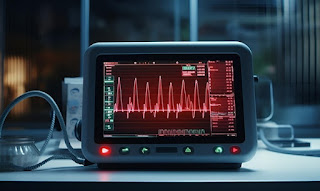Dehydration can cause an abnormally fast heart rate, also known as tachycardia. Here's how dehydration affects the heart and overall cardiovascular system:
Mechanisms by Which Dehydration Causes Tachycardia
Reduced Blood Volume:
- Dehydration leads to a decrease in the total blood volume. When blood volume is reduced, the heart has to work harder to pump the remaining blood throughout the body. This can result in an increased heart rate.
Electrolyte Imbalance:
- Dehydration can cause imbalances in electrolytes such as sodium, potassium, and calcium, which are essential for proper muscle function, including the heart. Electrolyte imbalances can disrupt the normal electrical activity of the heart, leading to an increased heart rate.
Decreased Blood Pressure:
- Reduced blood volume can also lead to lower blood pressure (hypotension). In response, the body may increase the heart rate to maintain adequate blood flow and pressure to vital organs.
Stress Response:
- Dehydration can trigger a stress response in the body, releasing hormones such as adrenaline (epinephrine) that can increase the heart rate.
Symptoms of Dehydration-Related Tachycardia
- Rapid heartbeat or palpitations
- Dizziness or lightheadedness
- Weakness or fatigue
- Dry mouth and skin
- Reduced urine output
- Dark-colored urine
Prevention and Management
Stay Hydrated:
- Drink plenty of fluids throughout the day, especially in hot weather or during physical activity. Water is generally the best choice, but electrolyte solutions can also help maintain balance.
Monitor Fluid Intake:
- Pay attention to your body's signals, such as thirst and urine color, to gauge hydration status. Aim for clear or light-colored urine.
Electrolyte Replacement:
- During prolonged exercise or exposure to heat, consider drinks that contain electrolytes to replace those lost through sweat.
Avoid Diuretics:
- Limit consumption of alcohol and caffeinated beverages, which can increase urine output and contribute to dehydration.
Medical Attention:
- If you experience persistent or severe symptoms of dehydration or tachycardia, seek medical attention. A healthcare provider can provide fluids intravenously and assess for any underlying conditions.
When to Seek Medical Help
- Severe dehydration symptoms such as confusion, fainting, or an inability to keep fluids down.
- A heart rate that is consistently above 100 beats per minute (for adults) at rest.
- Accompanied symptoms like chest pain, shortness of breath, or fainting.
By staying well-hydrated and paying attention to your body's needs, you can help prevent dehydration-related tachycardia and maintain overall cardiovascular health.



No comments:
Post a Comment